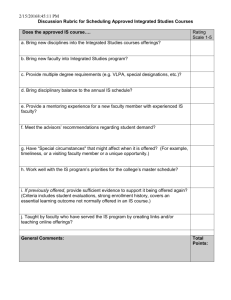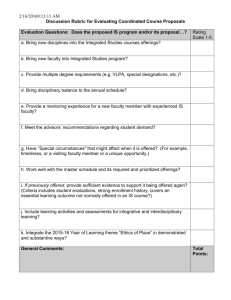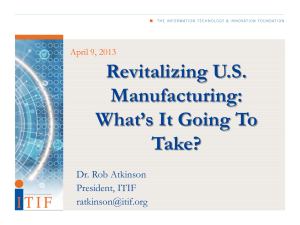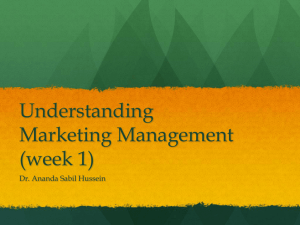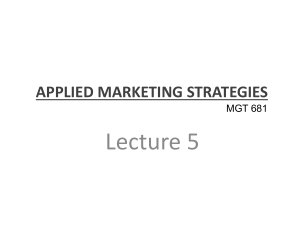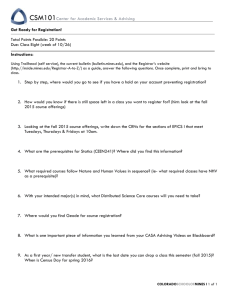You
advertisement
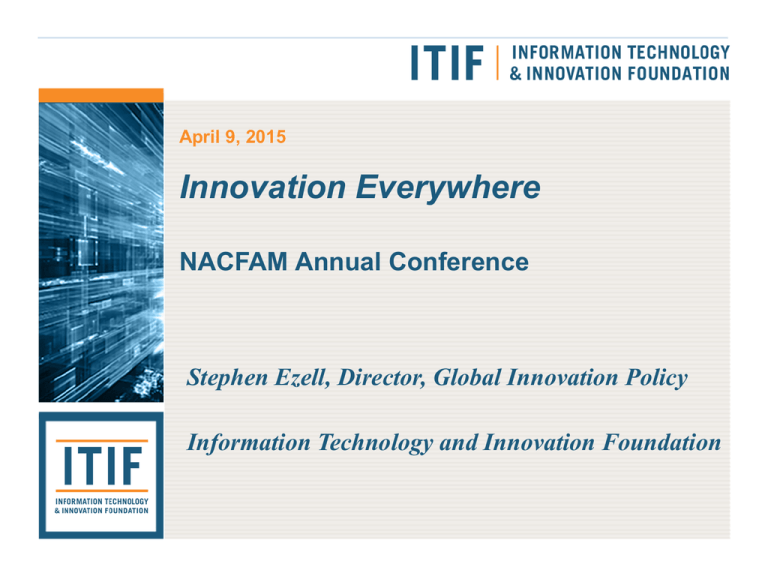
April 9, 2015 Innovation Everywhere NACFAM Annual Conference Stephen Ezell, Director, Global Innovation Policy Information Technology and Innovation Foundation ITIF is a Washington, D.C.-based think tank that seeks to design novel innovation policies and examine how innovation will create new opportunities to boost economic growth and improve quality of life. We focus on: Innovation “verticals”: energy, life sciences, telecom, manufacturing, and Internet and IT transformation Innovation “horizontals”: trade, tax, talent, and tech policy “Innovation economics” as an alternative to mainstream economics 2 3 4 What is Innovation? Innovation—The improvement of existing or the creation of entirely new products, processes, or services. (The Economist) Innovation—The transformation of existing conditions into preferred ones. (John Kao) 5 Innovation Isn’t Easy…Some Puzzles to Ponder… Why didn’t Western Union buy the telephone? Why didn’t Kodak commercialize the digital camera? Why didn’t IBM keep the operating system? Why didn’t Microsoft create the browser? Why didn’t AT&T create AOL? Why didn’t Sears create Wal-Mart? Why didn’t American Airlines create Southwest? Why didn’t Citibank create Paypal? It takes effort to stand in the future and see new possibilities. Just because you aren’t willing to disrupt your own business, doesn’t mean somebody isn’t willing to do it for you. Many companies don’t sense the need to innovate until it’s too late. 6 Competitive Separation * * * * Competitor 1 You Competitor 2 Competitor 3 * Create separation from your competitive set Do something that customers value highly and that your competitors either cannot or will not do Thereby gaining bargaining power to earn revenues and margins Competitive Set © 2006, TCG Advisors LLC Used with permission Source: Jon Pittman, Director of Corporate Strategy, Autodesk Innovation Continuum Impossible Impractical Source: Jon Pittman, Director of Corporate Strategy, Autodesk Possible Expected Required Impossible Impractical Breakthrough Innovation Possible Expected Required Impossible Impractical Possible Expected Required Sustaining Innovation Breakthrough Innovation Experimentation Sustaining Innovation Constant Improvement New Solutions Reliability Unexpected Surprises Scale Leveraging Trends Responding to Trends A Balanced Allocation of Innovation Resources/Efforts 12 Expected Returns from Innovation Investments 13 The Ten Types of Innovation How you join with others to create value How the enterprise makes money How you create your offerings How your products and services complement each other How you support and structure your business How you differentiate your offerings: features, performance, functionality How you connect your offerings with customers and users How you deepen relationships How you enable optimal experiences How you convey your offerings and business 14 Source: Larry Keeley et al., The Ten Types of Innovation: The Discipline of Building Breakthroughs (April 2013) Innovation in Practice Using Innovation Types Strategically Platform-Led extending capabilities and offerings to deliver value Business Model-Led configuring partnerships, revenue models, and assets to deliver value Customer ExperienceLed providing and engaging customers in optimal experiences to deliver value 15 Volume of Innovation Efforts 16 Volume of Innovation Efforts 17 Integrating more types of innovation delivers superior financial returns 5-Year Indexed Stock Price Returns of the Top Innovators vs. S&P 500 Stock Price (indexed to 100) 5+ Types of Innovation 45 companies 3–4 Types of Innovation 59 companies 1–2 Types of Innovation 34 companies S&P 500 2007 2008 2009 2010 2011 Source: Larry Keeley et al., The Ten Types of Innovation: The Discipline of Building Breakthroughs (April 2013) 18 Quiz: Is This a Product or a Service? 19 Quiz: Which Has Superior Market Share? 20 Perhaps some comparative data will help you decide. Cleans best Rinses cleanest Best fragrance Cost-efficient bottle Lowest cost/ounce Best shelf placement Highest ad budget ? Market share ? 21 Get Out Into the Field With Your Customers Macro market research video ethnography Latent Empathic and observational research customer satisfaction surveys Explicit focus groups Ethnography Psychography Anthropology Micro Adapted from Alan South, IDEO London 22 Why It Matters – The Smile Curve 23 Thank You Stephen Ezell sezell@itif.org Follow ITIF: Twitter: @sjezell Facebook: facebook.com/innovationpolicy Blog: www.innovationpolicy.org Website: www.itif.org
